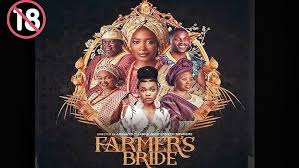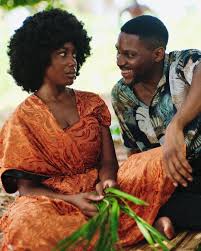
Movie Review: Farmer’s Bride
- Share
- Share
- Share
- Share
Director(s): Adebayo Tijani
Release Date: September 27, 2024
Movie Duration: 1hr 43mins
Rating:18
Cast: Gbubemi Ejeye, Tobi Bakre, Femi Branch, Wumi Toriola, Efe Irele, Mercy Aigbe,
“Farmer’s Bride” is a captivating Nigerian drama that delves deep into love, betrayal, and redemption, with a storyline that keeps viewers invested throughout.
Directed by Adebayo Tijani and Jack’enneth Opukeme, the film promises a mix of drama and suspense that successfully pulls in its audience. It delivers not just an emotional experience but also a cinematic one, with strong performances and thoughtful production choices that enhance the story’s impact.
Plot
The plot centers around Odun, a prosperous farmer who finds himself drawn to Funmi, a young woman he marries in hopes of finding companionship and happiness. As the film progresses, it becomes clear that the couple’s relationship is far from smooth.
Funmi struggles with the new life she is thrust into, and the resulting tension brings out hidden issues in both characters. Their relationship is riddled with personal battles that challenge the notions of love and commitment, setting the stage for a gripping drama.
Characterization
Character development is one of the film’s strongest assets. Odun and Funmi are portrayed with remarkable depth, making them feel like real people rather than just characters. Gbubemi Ejeye, who plays Funmi, gives a nuanced performance that captures the inner turmoil of her character.
The complexities in her expressions and emotions bring a genuine touch to the film, making the audience empathize with her struggles. Odun, on the other hand, is portrayed as a man who, despite his wealth, faces emotional battles of his own, offering a well-rounded portrayal that adds to the film’s layered storytelling.
The supporting cast also deserves recognition, with Tobi Bakre and Femi Branch delivering solid performances that complement the lead actors.
Their roles, while not as deeply explored as the main characters, add to the overall narrative and help drive the story forward. The dynamics between the characters create moments of tension and relief, keeping the audience engaged and adding depth to the film’s plot.

Positive
Visually, the film is a treat, with stunning cinematography that captures the beauty and simplicity of 1980s Ibadan. The camera work effectively brings out the rustic charm of the setting, making it an integral part of the story.
The visual portrayal of the era enhances the film’s authenticity, allowing viewers to feel immersed in the time period. The use of natural landscapes and traditional architecture helps to ground the narrative in a specific cultural context, which adds a layer of richness to the story.
The soundtrack plays an important role in setting the mood throughout the film, although it has its ups and downs. While certain tracks successfully evoke the emotions needed for particular scenes, at other times, the music feels out of sync with the narrative.
These occasional mismatches slightly detract from the film’s overall impact, but they don’t overshadow the emotional resonance created by the performances and story.
When it comes to pacing, “Farmer’s Bride” maintains a mostly steady flow, moving smoothly between moments of tension and calm. However, there are a few scenes where the pacing feels a bit rushed, not allowing certain emotional beats to fully resonate.

This does not significantly affect the overall narrative but does leave some room for improvement, especially in scenes that could benefit from a slower buildup.
The dialogue is another standout feature, written in a way that feels natural and engaging. The conversations between characters are not only believable but also contain memorable lines that add to the film’s impact.
These dialogues help in deepening the character arcs and in highlighting the film’s major themes, making the story feel more genuine and relatable.
The movie’s themes of love, betrayal, and redemption are explored with care, providing the story with depth and meaning.
The struggles that Odun and Funmi face in their relationship mirror broader societal issues, creating a connection between the personal and the communal.
This thematic richness is one of the film’s greatest strengths, allowing it to resonate with viewers on multiple levels.

In terms of originality, while the storyline is compelling, it does feel somewhat familiar, as it follows a narrative arc that has been seen in other films.
The plot twist, though executed well, can be anticipated by viewers who are familiar with the genre. This predictability doesn’t ruin the film but does make it less surprising, which may affect its appeal to some viewers.
However, the suspenseful moments are executed effectively, creating an atmosphere of tension that keeps viewers on the edge of their seats.
These moments are where the film truly shines, with well-crafted scenes that elevate the drama and add an element of thrill to the storyline. The combination of suspense and drama helps maintain the film’s momentum, keeping the audience intrigued.
The emotional impact of “Farmer’s Bride” is strong, especially during its climax, where the characters’ struggles and growth reach their peak.

The film’s ability to evoke a range of emotions is a testament to its solid storytelling and strong performances. Viewers are likely to find themselves emotionally invested in the characters’ journeys, which enhances the overall viewing experience.
The film also brings cultural relevance to the forefront, shedding light on Nigeria’s heritage and traditional values. By setting the story in the 1980s, it provides a glimpse into the past, showcasing the customs and societal expectations of that era.
This cultural backdrop adds another layer to the film, enriching the story and making it more than just a personal drama.
Moreover, “Farmer’s Bride” doesn’t shy away from offering social commentary, touching on issues such as marital expectations and societal pressure.
The film uses its characters’ experiences to provoke thought and discussion, adding substance to the narrative. These elements contribute to making the film more than just entertainment, as it encourages viewers to reflect on the themes presented.
The production quality is high, with impressive set designs and costume choices that reflect the time period accurately. The attention to detail in the costumes, especially, enhances the film’s authenticity.

The clothing worn by the characters not only looks the part but also helps to visually tell the story, adding to the film’s overall appeal.
Negative
The film does, however, have a few drawbacks, one of which is the predictability of the plot twist. While the twist is an important part of the story, it could have been handled in a way that added more surprise or complexity to the narrative. This would have made the storyline more engaging and unpredictable.
Another area where the film falls short is in the development of some supporting characters. While the main characters are well fleshed out, a few side characters don’t get the same level of attention. This leaves certain aspects of the story feeling less explored and somewhat shallow.
In conclusion, “Farmer’s Bride” is a compelling drama that effectively explores complex themes, featuring standout performances and impressive production choices.
While it has its minor flaws, the film succeeds in delivering a story that is both emotionally resonant and culturally significant. Fans of Nigerian cinema and drama enthusiasts will find it a worthy watch.


